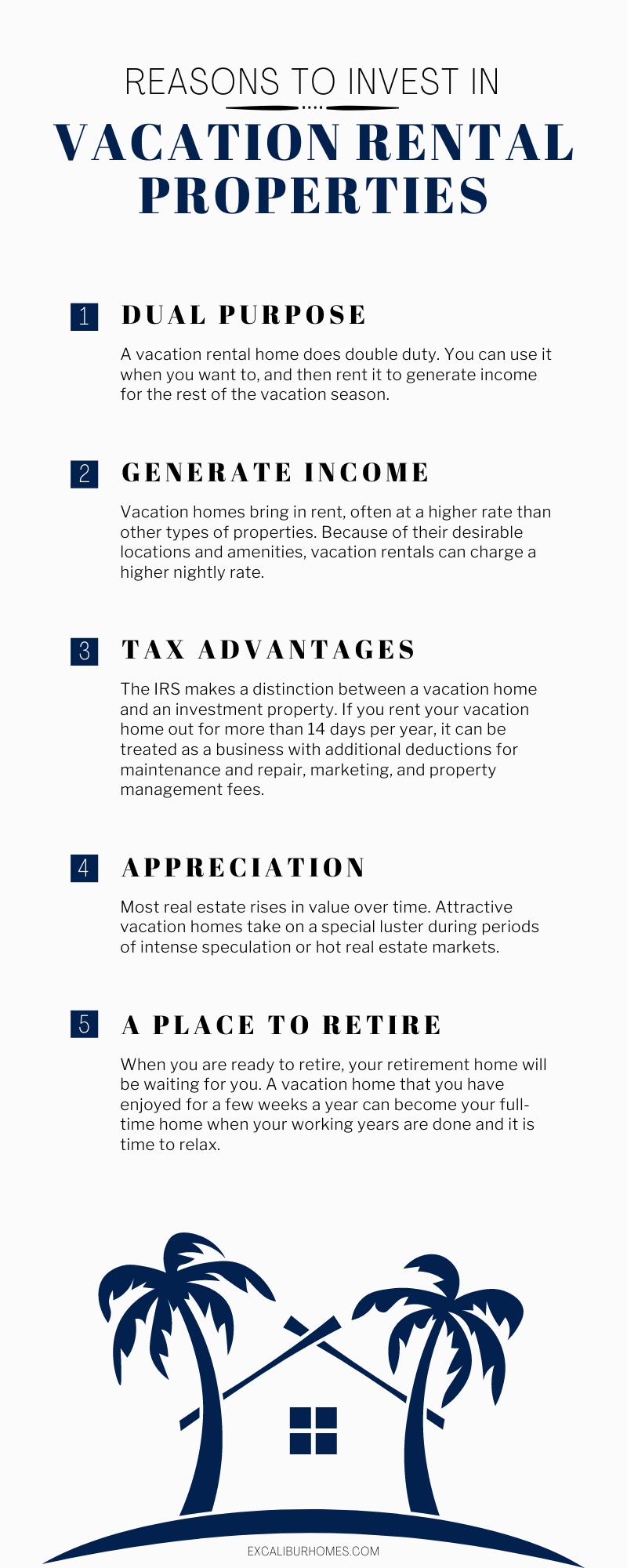
Real estate investors buy for a variety of reasons: they see appreciation potential, opportunity to generate income from rentals, or a chance to flip fast for a profit. One sector that should be under consideration for property owners is homes suitable for short-term leases in areas attractive for outdoor recreation and relaxation. Examine reasons to invest in vacation rental properties as you build your portfolio of rental homes.
Dual Purpose
A vacation rental home does double duty. You can use it when you want to, and then rent it to generate income for the rest of the vacation season. You can stay for the entire summer and rent the home out in the fall. Obviously, the location and climate will define the desirability of the home and how many months of the year you may be able to find tenants easily.
Generate Income
Vacation homes bring in rent, often at a higher rate than other types of properties. Because of their desirable locations and amenities, vacation rentals can charge a higher nightly rate. Vacancies tend to be lower during busy seasons. Even if your vacation property fails to attract the stream of short-term tenants you expected, you can pivot and offer it as a long-term lease.
Tax Advantages
Owning a second home delivers certain tax advantages, like additional mortgage deductions. Although the rental income will be taxable, other expenses may serve as deductions. The IRS makes a distinction between a vacation home and an investment property. If you rent your vacation home out for more than 14 days per year, it can be treated as a business with additional deductions for maintenance and repair, marketing, and property management fees. The tax implications of owning a vacation home can get complicated, so it is always wise to consult your accountant or attorney before taking the plunge.
Appreciation
Vacation rentals are in attractive locations. Many of these locations have restrictions on additional buildings or are fully developed. This type of scarcity coupled with demand creates price appreciation. Most real estate rises in value over time. Attractive vacation homes take on a special luster during periods of intense speculation or hot real estate markets.
A Place to Retire
When you are ready to retire, your retirement home will be waiting for you. A vacation rental turns can into a retirement haven easily if you choose an all-season home in a location with essential services like health care and groceries nearby. A vacation home that you have enjoyed for a few weeks a year can become your full-time home when your working years are done and it is time to relax.
Considerations Before Buying A Vacation Rental
While vacation rentals can be excellent income-generating investments, there are many considerations to ponder before buying a vacation rental home. These include:
- Finances: Second mortgages for second homes may be tougher to get and may require a larger down payment. You may need to show you have substantial cash on hand to cover both the mortgage for your primary residence and the mortgage on the second home. This is true even if you have prepared a well-researched business plan for renting your vacation home as an income-producing property. Until the home rents for weeks on end, you really don’t know how much income you will generate.
- Insurance: Rental property insurance is different than insurance for owner-occupied houses. Shop around and ask your attorney about what terms you should be certain are included in rental home insurance.
- Local laws and regulations: Be sure to check if rental homes are allowed where you are thinking of buying. Many locations have restrictions on short-term rentals. Other vacation areas thrive on rental homes, but they are also strict about safety, maximum occupancy, and use of public or association facilities like pools and beaches by non-residents. Some areas are prone to drought and restrict water use.
- Internet access and cell signals: Some very attractive vacation locations have spotty internet service and practically no cell phone signal strength. Even though you would think vacationers need a break from screens, they aren’t willing to allow their teenagers to drive them insane with sullen looks when they can’t access their Instagram or TikTok accounts.
- Maintenance costs: that gorgeous wood deck will need to be cleaned and resealed regularly. Septic systems must be maintained. Areas with lots of wildlife may experience incursions by unwanted pests when the house is closed for the season. Summer destinations that suffer harsh winters, like properties Maine, need someone to look after the house and make sure pipes don’t freeze.
- Marketing: finding tenants for vacation rentals involves more than, “if you buy it, they will come.” Decide how you will market the home before you buy it. Finding tenants, processing lease documents, and collecting the deposit, rent, and any related fees is a job in itself. Property management companies can handle this aspect of investment property ownership for you. In Georgia, Excalibur Homes provides Cumming home property management for rental homes near Lake Lanier as well as the greater Metro Atlanta area.
- Seasonality: ideally, your vacation rental will be in a location that has four-season interest. Realistically, many vacation homes present themselves best for one season of the year. Beach areas have their high season in summer, while wooded mountains provide breathtaking fall foliage and winter skiing. Plan and budget for the number of weeks per year you believe you could realistically attract tenants to your vacation rental property.
- Pricing and competition: like any other property investment, pricing your vacation rental property correctly can make all the difference in profitability. Perform your due diligence and market analysis to find out if your expectations for your vacation rental are realistic.
For every reason to buy a vacation rental property, there may be an equal and opposite reason not to buy one, so you might want to stick to year-round, single-family home rentals instead. Peace of mind comes with reliable, consistent long-term tenants. The market for vacation homes can wildly swing up during times of speculation, but can also tank frighteningly in hard economic times. Consider how close you are to retirement, how many years of extra income you want to get out of the property, and how much additional expenses you are willing to take on with accountants and lawyers to comply with applicable laws and regulations. Examine your finances and how much you are willing to risk on an investment property. Vacation homes carry some reduced risks as well, simply as another asset that will appreciate over time, as a rental property that can generate a higher nightly rate, and as a home that can be transformed into a long-term rental or retirement haven.



